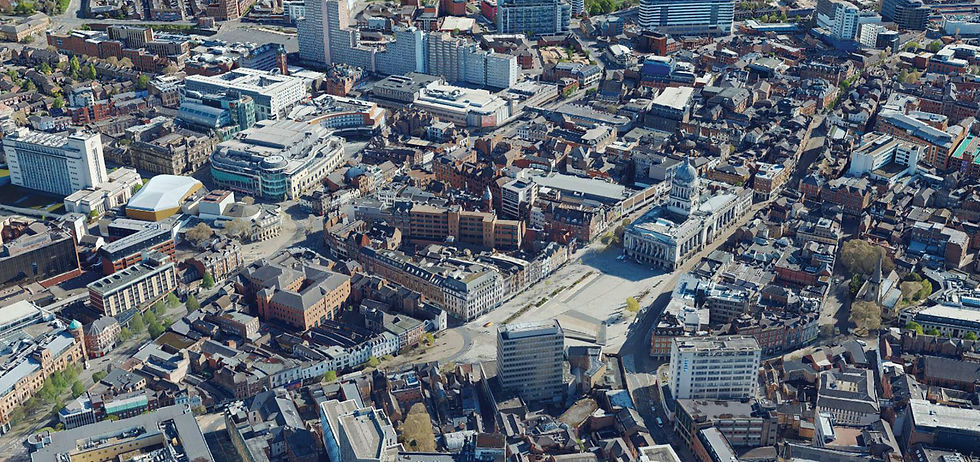EAASI leads discussions on the use of aerial surveying data at GWF 2023
- May 11, 2023
- 3 min read
The European Association of Aerial Surveying Industries (EAASI) participated in the Geospatial World Forum (GWF) as an Institutional Partner. The GWF is a premier global event that brings together geospatial industry leaders, policymakers, and professionals to explore and discuss the latest innovations and trends in geospatial technology and applications. In 2023, it took place in Rotterdam from 2-5 May, The Netherlands. More than 970 participants from 521 organizations attended this edition.
EAASI participated in two events during the conference, both on 4 May 2023. The association hosted a panel within the Land and Property program, titled Geographical Monitoring Systems for CO2 Emissions and Land Use Changes. Moderated by EAASI's President, Dr. Simon Musaeüs, the panel featured speakers from the European Commission's DG for Climate Action, Bluesky, and Telespazio.
Simon Kay, Deputy head of the unit at the European Commission’s Directorate-General for Climate Action (DG CLIMA), presented the climate law of the EU that aims to achieve climate neutrality by 2050. "This means a drastic reduction in greenhouse gas emissions, but also compensating for residual emissions (e.g., from industry or agriculture) through carbon removals, which implies removing carbon dioxide (CO2) from the Earth’s atmosphere via natural and technological solutions", explained Kay.
Photos courtesy of Geospatial World
The European Commission revised the Land Use, Land Use Change, and Forestry (LULUCF) Regulation and set the ambitious target of 310 Mtonnes by 2030 for net carbon removals in soil, forests, and wood products. In this line, in 2022 the European Commission presented the first voluntary EU-wide framework to certify carbon removals generated in Europe. In the next steps of this process, the Commission will approve detailed certification rules for carbon removals from both industrial and nature-based activities. Geodata will be required to measure, monitor, report, and verify the carbon removals. Remote sensing and aerial surveying data will be vital to obtaining this information. “GIS data in real-time will allow Member States to take data-driven decisions in the path to climate neutrality”, added Kay.
Rachel Tidmarsh, CEO at Bluesky International Limited and EAASI Treasurer, presented the National Tree Map (NTM), a detailed database of location, height, and canopy/crown extent for trees 3m and above in height covering England, Wales, Scotland, and the Republic of Ireland. She also shared an NTM case study from Waterford City & County Council of Ireland. The objective of the study was to make the entire city decarbonized zone under Ireland’s Climate Action Plan, which will make Waterford a carbon-neutral city by 2030.
Nicola De Quattro, Head of Innovation and Technology Governance, Telespazio Belgium talked about the goals of his company to integrate satellite data into existing ecosystems and to support companies to decarbonize their supply chain.
Furthermore, EAASI also joined the Geospatial Knowledge Infrastructure (GKI) Summit, which explored the future of the geospatial ecosystem and the role of stakeholders in national development. EAASI's Secretary-General, Marcos Martínez, moderated a panel discussion titled Future geospatial ecosystem stakeholders and their role in national development, which featured speakers from the Geospatial Commission in the UK, the Ministry of Environment, Water and Agriculture in Saudi Arabia, the Federal Office of Topography swisstopo in Switzerland, the National Institute of Geographic and Forest Information (IGN) in France, and the private company Hexagon.
“EAASI's participation in the Geospatial World Forum highlights the organization's commitment to advancing the geospatial industry and promoting collaboration among stakeholders. The GWF provided an excellent opportunity for EAASI to connect with other industry and public sector leaders and explore the latest trends and innovations in geospatial technology and applications. We look forward to continuing our participation in future GWF events and further contributing to the development of the geospatial ecosystem” said Marcos Martínez, the Secretary General of EAASI.











Comments